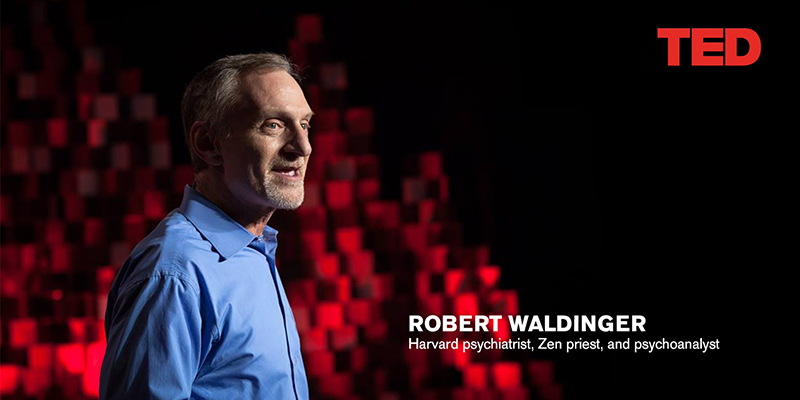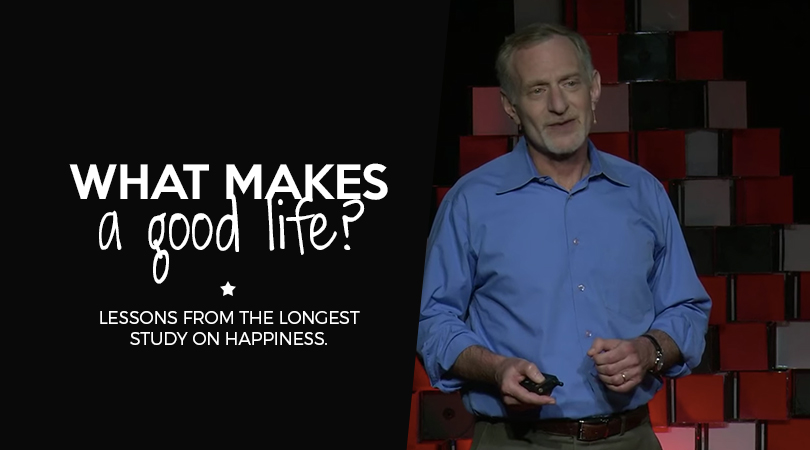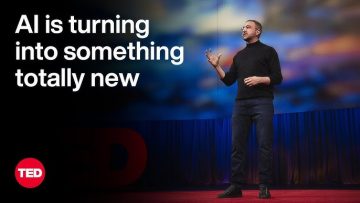罗伯特·沃尔丁格TED演讲:What makes a good life
What keeps us happy and healthy as we go through life? If you think it’s fame and money, you’re not alone – but, according to psychiatrist Robert Waldinger, you’re mistaken. As the director of 75-year-old study on adult development, Waldinger has unprecedented access to data on true happiness and satisfaction. In this talk, he shares three important lessons learned from the study as well as some practical, old-as-the-hills wisdom on how to build a fulfilling, long life.
罗伯特·沃尔丁格的TED演讲题为《什么构成美好的生活?来自对幸福的最长研究的启示》。演讲探讨了哈佛成人发展研究的发现,这是对成年生活和幸福进行的最长时间的研究之一。作为该研究的第四任主管,沃尔丁格深入探讨了追踪两组男性长达75年以上的生活历程所获得的关键见解。
在演讲中,沃尔丁格对社会对成功和幸福的常见观念提出挑战,揭示了我们人际关系质量对整体幸福感的重要影响。他通过引人入胜的证据和个人轶事强调了与家人、朋友和社区建立紧密、有意义的关系的重要性。演讲表明,培养健康的人际关系和社交联系对过上充实而幸福的生活至关重要。

Robert Waldinger’s TED Talk, titled “What Makes a Good Life? Lessons from the Longest Study on Happiness,” explores the findings of the Harvard Study of Adult Development, which is one of the longest-running studies on adult life and happiness. As the fourth director of this study, Waldinger delves into the key insights gained from tracking the lives of two groups of men for over 75 years.
In his talk, Waldinger challenges common societal beliefs about success and happiness, revealing that the quality of our relationships has a significant impact on our overall well-being. He shares compelling evidence and personal anecdotes to emphasize the importance of close, meaningful connections with family, friends, and community. The talk suggests that fostering healthy relationships and social connections is crucial for leading a fulfilling and content life.
罗伯特·沃尔丁格是一位美国精神科医生、精神分析学家和教授。他以担任哈佛成人发展研究的主任而闻名,这是一项持续了80多年的综合性研究项目。该研究是对成年生活和幸福进行的最长时间的调查之一。沃尔丁格获得了哈佛大学的学士学位和哈佛医学院的医学学位。他是哈佛医学院的精神病学临床教授,也是马萨诸塞州总医院的精神科医生。
除了他在医学和学术领域的成就之外,沃尔丁格以他的TED演讲《什么构成美好的生活?来自对幸福的最长研究的启示》而广受关注。这个演讲因其对导致充实和有意义的生活因素的深刻洞察而备受瞩目。通过他在哈佛成人发展研究和公共参与方面的工作,沃尔丁格已经成为积极心理学和幸福领域的杰出人物。他对关于幸福和生活满足度的讨论产生了深远的影响,强调了人际关系和社交联系的重要性。

Robert Waldinger is an American psychiatrist, psychoanalyst, and professor. He is best known for his role as the director of the Harvard Study of Adult Development, a comprehensive research project that has been ongoing for more than 80 years. The study is one of the longest-running investigations into adult life and happiness.
Waldinger earned his bachelor’s degree from Harvard University and his medical degree from Harvard Medical School. He is a Clinical Professor of Psychiatry at Harvard Medical School and a psychiatrist at Massachusetts General Hospital.
In addition to his medical and academic pursuits, Waldinger is recognized for his TED Talk titled “What Makes a Good Life? Lessons from the Longest Study on Happiness.” The talk has garnered widespread attention for its insights into the factors that contribute to a fulfilling and meaningful life.
Through his work on the Harvard Study of Adult Development and his public engagement, Waldinger has become a prominent figure in the field of positive psychology and well-being. His emphasis on the significance of relationships and social connections has had a profound impact on discussions about happiness and life satisfaction.
以下是罗伯特·沃尔丁格TED演讲:《什么构成美好的生活》的英文文本:
1–What keeps us healthy and happy as we go through life?
2–If you were going to invest now in your future best self, where would you put your time and your energy?
3–There was a new recent survey of millennials [mɪ’lenɪəl] asking them what their most important life goals were,
4–and over 80% said that a major life goal for them was to get rich.
5–And another 50% of those same young adults said that another major life goal was to become famous.
6–And we’re constantly told to lean in to work, to push harder and achieve more.
Lean into sth:to embrace or approach a situation, challenge, or opportunity with enthusiasm, dedication, and a proactive attitude. It often implies actively participating, taking initiative, or fully engaging in a particular endeavor. 以积极的态度、敬业心和主动的精神去拥抱或面对某种情境、挑战或机会。通常表示积极参与、采取主动或全身心投入到特定的事业中。
7–We’re given the impression that these are the things that we need to go after in order to have a good life.
8–Pictures of entire lives, of the choices that people make and how those choices work out for them.
Something work out for someone:a situation or plan has unfolded or developed favorably for that person. It implies a positive resolution, success, or a satisfactory outcome in a particular context. (”某事对某人产生了积极的结果” 意味着某个情况或计划对这个人而言发展得非常顺利。它暗示着在特定情境中取得了积极的解决方案、取得成功或获得了满意的结果。)
9–Those pictures are almost impossible to get.
10–Most of what we know about human life, we know from asking people to remember the past.
11–And as we know, hindsight is anything but 20/20.
Hindsight:refers to the understanding or awareness of a situation, event, or decision after it has occurred. It involves looking back at the past with the knowledge or insight gained from subsequent experiences. It often implies a clearer understanding or evaluation of something in retrospect. “事后诸葛亮” 指的是在某事发生之后对该事件、决定或局面的理解或认知。它包括通过后续经验所获得的知识或洞察力回顾过去。这通常意味着对某事在回顾中有更清晰的理解或评估。
The phrase “Hindsight is 20/20” is an idiomatic expression that conveys the idea that it’s easier to understand or evaluate events or decisions after they have already happened. The metaphorical use of “20/20” refers to perfect vision, suggesting that with hindsight, one has a clearer perspective on past events.
The origin of the phrase can be traced to the field of optometry, where “20/20 vision” is considered normal visual acuity. The expression likely evolved over time, with the idea that having perfect vision retrospectively allows for a more accurate assessment of past situations.
短语“事后诸葛亮”是一个惯用语,表达了在某事件或决策发生后更容易理解或评估的概念。隐喻中的“20/20”表示完美的视力,暗示通过事后认知,人们对过去的事件有更清晰的视角。
该短语的起源可以追溯到视光学领域,“20/20视力”被认为是正常的视觉敏锐度。这个表达可能随着时间的推移逐渐演变,其中的核心思想是,在事后拥有完美的视力可以更准确地评估过去的情况。
12–We forget vast amounts of what happens to us in life, and sometimes memory is downright creative.
13–But what if we could watch entire lives as they unfold through time?
14–What if we could study people from the time that they were teenagers all the way into old age
15–to see what really keeps people happy and healthy?
16–We did that, the Harvard Study of Adult Development
17–may be the longest study of adult life that’s ever been done.
18–For 75 years, we’ve tracked the lives of 724 men,
19–year after year, asking about their work, their home lives, their health, and of course, asking all along the way,
20–without knowing how their life stories were going to turn out.
21–Studies like this are exceedingly (非常、极其) rare.
22–Almost all projects of this kind fall apart within a decade
23–because too many people drop out of the study, or funding for the research dries up,
24–or the researchers get distracted, or they die, and nobody moves the ball further down the field.
25–But through a combination of luck and the persistence of several generations of researchers,
26–this study has survived.
27–About 60 of our original 724 men
28–are still alive, still participating in the study, most of them in their nineties.
29–And we are now beginning to study the more than 2000 children of these men.
30–And I’m the 4th director of the study.
31–Since 1938, we’ve tracked the lives of two groups of men.
32–The 1st group started in the study when they were sophomores at Harvard College.
33–They all finished college during World War II, and then most went off to serve in the war.
34–And the 2nd group that we’ve followed was a group of boys
35–from boston’s poorest neighborhoods,
36–boys who were chosen for the study specifically because they were from some of the most troubled
37–and disadvantaged families in the Boston of the 1930s.
38–Most lived in tenements [ ‘tenəmənts(公寓房间)] , many without hot and cold running water.
39–When they entered the study, all of these teenagers were interviewed.
40–They were given medical exams. We went to their homes, and we interviewed their parents.
41–And then these teenagers grew up into adults who entered all walks of life. 然后这些青少年长大成为进入社会各行各业的成年人
Walks of life: it refers to the different occupations, lifestyles, or social positions that people have. It encompasses the various paths or ways in which individuals live and work. (生活领域、人生道路)
42–They became factory workers and lawyers and bricklayers [‘brɪkleɪə(r) (砖瓦匠)]and doctors,
43–one president of the United States.
Of the original Harvard cohort recruited as part of the Grant Study, only 19 are still alive, all in their mid-90s. Among the original recruits were eventual President John F. Kennedy and longtime Washington Post editor Ben Bradlee. (Women weren’t in the original study because the College was still all male.) 信息来源:哈佛大学官网
44–Some developed alcoholism. A few developed schizophrenia [ˌskɪtsə’friːniə (精神分裂症)].
45–Some climbed the social ladder from the bottom all the way to the very top.
46–And some made that journey in the opposite direction.
47–The founders of this study would never in their wildest dreams have imagined that
48–I would be standing here today, 75 years later, telling you that the study still continues.
49–Every two years, our patient and dedicated research staff calls up our men and ask them
50–if we can send them yet one more set of questions about their lives.
51–Many of the inner city Boston men ask us,
52–why do you keep wanting to study me? My life just isn’t that interesting?
53–The Harvard men never ask that question.
54–To get the clearest picture of these lives, we don’t just send them questionnaires.
55–We interview them in their living rooms.
56–We get their medical records
57–from their doctors. We draw their blood, we scan their brains.
58–We talk to their children.
59–We videotape them talking with their wives about their deepest concerns.
60–And when, about a decade ago,
61–we finally asked the wives if they would join us as members of the study,
62–many of the women said, you know, it’s about time.
63–So what have we learned?
64–What are the lessons that come from the tens of thousands of pages of information
65–that we’ve generated on these lives.
66–Well, the lessons aren’t about wealth or fame or working harder and harder.
67–The clearest message that we get from this 75 year study is this
68–Good relationships keep us happier and healthier.
69–Period, we’ve learned three big lessons about relationships.
70–The 1st is that social connections are really good for us, and that loneliness kills
71–It turns out that people who are more socially connected to family, to friends, to community,
72–are happier, they’re physically healthier, and they live longer than people who are less well connected.
73–And the experience of loneliness turns out to be toxic.
74–People who are more isolated than they want to be from others find that they are less happy.
75–Their health declines earlier in midlife, their brain functioning declines sooner,
76–and they live shorter lives than people who are not lonely.
77–And the sad fact is that at any given time,
78–more than one in five Americans will report that they’re lonely.
79–And we know that you can be lonely in a crowd, and you can be lonely in a marriage.
80–So the 2nd big lesson that we learned is that
81–it’s not just the number of friends you have,
82–and it’s not whether or not you’re in a committed relationship,
83–but it’s the quality of your close relationships that matters.
84–It turns out that living in the midst of conflict is really bad for our health.
85–High conflict marriages, e.g. without much affection,
86–turn out to be very bad for our health.
87–Perhaps worse than getting divorced.
88–And living in the midst of good, warm relationships is protective.
89–Once we had followed our men all the way into their eighties,
90–we want to look back at them at midlife
91–and to see if we could predict
92–who was going to grow into a happy, healthy octogenarian [ˌɒktədʒə’neəriən (八旬老人,80-90岁老人)] and who wasn’t.
注:octopus [‘ɒktəpəs (章鱼)] ;Octagon [‘ɒktəɡən (八角形、八边形)] ;Octuplet [‘ɒktjuːplet (八胞胎之一;由八部分组成的事物)] ;October(十月,拉丁文意为第八个月);Octennial [ɒk’tenjəl (八年一次的)]
93–And when we gathered together everything we knew about them at age 50,
94–it wasn’t their middle aged cholesterol [kə’lestərɒl] levels that predicted how they were going to grow old.
95–It was how satisfied they were in their relationships.
96–The people who were the most satisfied in their relationships at age 50
97–were the healthiest at age 80.
98–And good, close relationships seem to buffer us from some of the slings and arrows of getting old.
Buffer someone from sth:To provide protection or lessen the impact of something challenging or harmful. In the context of relationships and health, it means that good relationships act as a protective barrier against the negative effects of certain challenges or stressors. 提供保护或减轻某种具有挑战性或有危害性事物的影响。在关系和健康的背景下,这意味着良好的人际关系充当一种保护屏障,抵御某些挑战或压力的负面影响。
Slings and arrows:Slings and arrows are unpleasant things that happen to you and that are not your fault. This expression, often used in the phrase “the slings and arrows of outrageous fortune,” is a metaphor for life’s adversities, challenges, or misfortunes. 这个表达常常在短语“the slings and arrows of outrageous fortune(荒谬命运的投石车和箭)”中使用,是生活逆境、挑战或不幸的隐喻。
99–Our most happily partnered men and women reported in their eighties
100–that on the days when they had more physical pain, their mood stayed just as happy.
101–But the people who were in unhappy relationships,
102–on the days when they reported more physical pain,
103–it was magnified [‘mægnɪfaɪd (被放大了的)] by more emotional pain.
104–And the 3rd big lesson that we learnt about relationships and our health
105–is that good relationships don’t just protect our bodies, they protect our brains.
106–It turns out that being in a securely attached relationship to another person in your eighties is protective.
107–That the people who are in relationships
108–where they really feel they can count on the other person in times of need,
109–those people’s memories stay sharper longer.
110–And the people in relationships where they feel they really can’t count on the other one,
111–those are the people who experience earlier memory decline.
112–And those good relationships, they don’t have to be smooth all the time.
113–Some of our octogenarian [ˌɒktədʒə’neəriən (八旬老人,80-90岁老人)] couples could bicker with each other day in and day out,
Bicker with someone:To engage in a petty or trivial quarrel, argument, or disagreement, often characterized by continuous, irritating exchanges. (实行琐碎或微不足道的争吵、争论或分歧,通常以持续、恼人的交流为特征。)
114–but as long as they felt that they could really count on the other when the going got tough,
115–those arguments didn’t take a toll on their memories.
Take a toll on someone:To have a negative impact or cause harm to someone over time, often resulting in physical or emotional strain. (长时间对某人产生负面影响或造成伤害,通常导致身体或情感上的压力。)
116–So this message that good, close relationships are good for our health and well being,
117–this is wisdom that’s as old as the hills. 这是老生常谈的智慧
Sth as old as the hills:Refers to something that is extremely old or ancient, having existed for a very long time. (存在久远的;老生常谈的;亘古不变的: )
It’s classic, time immemorial [ˌɪmə’mɔːriəl (古老的,远古的)], Hutch I starts it, Hutch II grows it, Hutch III blows it. Shirtsleeves to shirtsleeves in three generations. –这是亘古不变的现象/典型事物,哈奇一世开创,二世发展,三世搞砸,富不过三代。
118–Why is this so hard to get and so easy to ignore?
119–Well, we’re human. What we’d really like is a quick fix,
120–something we can get that’ll make our lives good and keep them that way.
121–Relationships are messy and they’re complicated,
122–and the, the hard work of tending to family and friends,
123–that’s not sexy (迷人的) or glamorous [‘ɡlæmərəs (有诱惑力的) ].
124–It’s also lifelong. It never ends.
125–The people in our 75 year study who were the happiest in retirement
126–were the people who had actively worked to replace workmates with new playmates.
127–Just like the millennials in that recent survey,
128–many of our men, when they were starting out as young adults,
129–really believed that fame and wealth and high achievement
130–were what they needed to go after to have a good life.
131–But over and over, over these 75 years, our study has shown
132–that the people who fared the best were the people who leaned into relationships
Fare:In this context, “fare” means to experience or manage a situation, especially in terms of one’s well-being or success. The sentence suggests that, repeatedly, over the course of 75 years, the study has revealed that individuals who had the best experiences or managed their lives most successfully were those who actively engaged in relationships with family, friends, and the community.
133–with family, with friends, with community.
134–So what about you? Let’s say you’re 25, or you’re 40 or you’re 60.
135–What might leaning into relationships even look like?
136–Well, the possibilities are practically endless.
137–It might be something as simple as replacing screen time with people time,
138–or livening up a stale [steɪl (陈旧的,陈腐的,无新意的;厌倦的,疲倦的,没精打采的) ] relationship by doing something new together,
Liven up something:it means to make something more interesting, exciting, or lively. (使某事更加有趣活泼” 意指使某事变得更有趣、令人兴奋或更生动。)
139–long walks or date nights, or reaching out to that family member who you haven’t spoken to in years.
Reach out to someone:it means to initiate contact or communicate with someone, often with the intention of offering help, support, or establishing a connection. (与某人取得联系” 意指主动与某人取得联系或沟通,通常是为了提供帮助、支持或建立联系。)
140–Because those all too common family feuds (长期不和;争执、闹别扭)
141–take a terrible toll on the people who hold the grudges.
142–I’d like to close with a quote from Mark Twain.
143–More than a century ago, he was looking back on his life,
144–and he wrote this,
145–There isn’t time, so brief is life for bickerings, apologies, heartburnings, callings to account. 时光荏苒,生命短暂,别将时间浪费在争吵、道歉、生闷气/上火和责备上。
Callings to account:It means holding someone responsible or requiring them to explain their actions. It implies a demand for justification or an examination of one’s conduct. (追究责任,要求说明行为)
146–There is only time for loving and but an instant, so to speak, for that. 用时间去爱吧,哪怕只有一瞬间,也不要辜负。
147–The good life is built with good relationships. 美好人生,从良好的人际关系开始。
148–Thank you.
以下是罗伯特·沃尔丁格TED演讲:《什么构成美好的生活》的精彩评论:





@jamesanthony5681 (1年前)
@notoriousbui 2年前(修改过)
@Daisy-gr1qb 2年前(修改过)